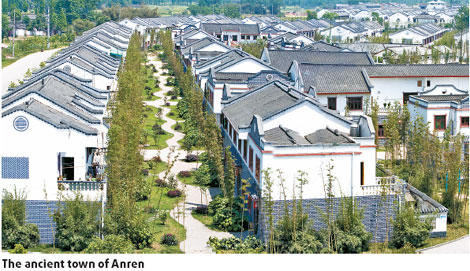


"The young should never move to Sichuan and the old should never leave."
That aphorism intends to convey a sense of the relaxed ways of Sichuan province since ancient times.
Even hundreds of years ago there was the danger the youth would be beguiled by the area's laid-back lifestyle - and accomplish less than they might elsewhere.
The reason urban residents flock to Sichuan's countryside on weekends or holidays is for a return to nature and respite from busy urban life. The trip to local farmhouses and surrounding towns has emerged as a good choice for relaxation and entertainment.
Since the 1990s, a new tourism model has prevailed in the suburbs and countryside around Chengdu, capital of Sichuan. Using their farmhouses and competitive prices, peasants attract a great number of tourists and provide a range of services. Total annual revenue generated in the countryside has reached 700 to 800 million yuan.
The tourists can appreciate the scenery, strong folk customs and ancient culture of the Shu Kingdom (AD 221-263) in the west of Sichuan province. With good preparation and arrangements made by farmhouse owners, tourists can eat local food and enjoy relaxations that include playing cards and mahjong, singing karaoke, looking at the natural scenery and picking fruit.
The 22nd Chengdu International Peach Flower Festival was held in March in Longquan county this year, attracting millions of tourists from home and abroad.
Longquan County is famous for its flowers and fruits all year around. It boasts more than 17 million trees that bear fruit and different kinds of colorful flowers. A great variety of celebrations or activities are highlights of the festival including trade talks and exhibitions.
Tourists say they are attracted to the natural and simple way of life, such as walks along country roads where locals and tourists talk together and laugh all the way.
Tourist destinations
Chengdu boasts a long history and splendid culture. Besides many famous tourist destinations including the Temple of Marquis and Du Fu Thatched Cottage, the city is also characterized by the surrounding ancient towns.
During their journey to well-preserved ancient areas, visitors can enjoy the comfortable and elegant lifestyle, buy hand-made crafts or local and traditional products and feel the simple way of life - all a far cry from the urban life.
The ancient town of Huanglongxi about 30 km from Chengdu is one of the top 10 waterside towns in China with a history that dates back more than 1,700 years. It has recently renewed six main ancient roads to restore their original style.
The ancient town features the architecture of the Ming (1368-1644) and Qing (1644-1911) dynasties in good form.
Visitors feel like they are returning to the past, walking on floors made of stone and appreciating the houses or attics made of wood pillars and green tiles and delicately carved windows and railings. Six banyan trees over 1,000 years old decorate the ancient town and provide dense shade and vitality. The three ancient temples that are well preserved are located down winding roads.
Teahouses are part of the comforting scenery in the ancient town. Along the roads, on riverbanks, or in bamboo forests, drinking tea and chatting at teahouses is central to Sichuan life. During Spring Festival the town holds a range of traditional activities including temple fairs to bring tourists back to vibrant scenes of ancient times.
(China Daily 08/11/2008 page3)













